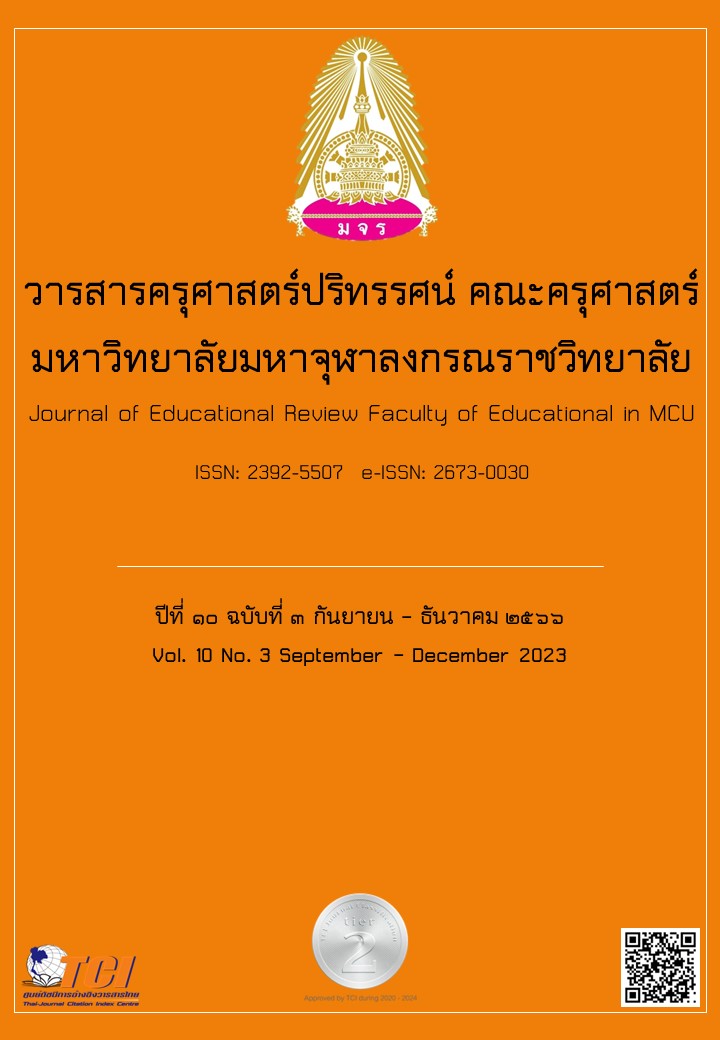PRIORITY NEEDS FOR TEACHER DEVELOPMENT OF EAKACHAI SCHOOL BASED ON THE CONCEPT OF SOCIAL ENTREPRENEUR
Main Article Content
Abstract
This research article’s objectives were 1) to study the necessary needs in teacher development of social entrepreneur at Ekachai School. 2) To present the guidelines for teacher development at Ekachai School based on the concept of social entrepreneur. This research used a descriptive research method. The population used in this research was Ekachai School. The informant were school’s director, deputy director and teachers. The research tool was the need questionnaire for teacher development at Ekachai School. based on the concept of social entrepreneur with a confidence value of 0.926. The statistics used in data analysis were frequency, percentage, arithmetic mean, standard deviation and needs analysis (PNImodified). The results showed that Necessary needs for teacher development at Ekachai School based on the concept of social entrepreneur concept is at a high level (PNImodified=0.376). When analyzing individual needs, it was found that creativity and innovation ability to solve social problems were ranked the highest (PNImodified=0.414), followed by goals and determination to solve social problems (PNImodified=0.400), expertise and understanding of social affairs (PNImodified=0.396), risk-taking (PNImodified=0.376), and the aspect of creating value and being able to create social networks (PNImodified = 0.374). Meanwhile, the aspect of good governance in social affairs had the least necessary needs index (PNImodified=0.305). In terms of models and methods for developing social entrepreneurship characteristics of teachers, the highest frequency is work-based learning, followed by self-learning.
Article Details

This work is licensed under a Creative Commons Attribution-NonCommercial-NoDerivatives 4.0 International License.
ทัศนะและความคิดเห็นที่ปรากฏในบทความในวารสารฉบับนี้ถือเป็นความรับผิดชอบของผู้เขียนบทความนั้นเพียงผู้เดียว และไม่ถือเป็นทัศนะและความรับผิดชอบของกองบรรณาธิการ
กองบรรณาธิการขอสงวนสิทธิ์ในการคัดเลือกบทความลงตีพิมพ์และจะแจ้งให้เจ้าของบทความทราบหลังจากผู้ประเมินบทความตรวจอ่านบทความแล้ว
ต้นฉบับที่ได้รับการตีพิมพ์ในวารสารครุศาสตร์ปริทรรศน์ คณะครุศาสตร์ มหาวิทยาลัยมหาจุฬาลงกรณราชวิทยาลัย ถือเป็นกรรมสิทธิ์ของคณะครุศาสตร์ มหาวิทยาลัยมหาจุฬาลงกรณราชวิทยาลัย ห้ามนำข้อความทั้งหมดหรือบางส่วนไปพิมพ์ซ้ำ เว้นเสียแต่ว่าจะได้รับอนุญาตจากมหาวิทยาลัยฯ เป็นลายลักษณ์อักษร
References
เกรียงศักดิ์ เจริญวงศ์ศักดิ์. (2550). การประกอบการเพื่อสังคม : กระบวนทัศน์ใหม่เพื่อรังสรรค์สังคม. สยามรัฐรายวัน. 15(84). (28 ส.ค. 2550).
ชณวรรต ศรีลาคำ. (2562) ทิศทางการเรียนรู้ด้วยตนเองตามนโยบายประเทศไทย 4.0. วารสารมนุษยศาสตร์ ฉบับบัณฑิตศึกษา มหาวิทยาลัยรามคำแหง. 8(1). 49-62.
ชวนคิด มะเสนะ. (2559). การพัฒนาทรัพยากรบุคคลทางการศึกษาในทศวรรษหน้า. วารสารบริหาร การศึกษาบัวบัณฑิต มหาวิทยาลัยราชภัฏอุบลธานี. 16(1). 9-16.
พิพัฒน์ นนทนาธรณ์. (2559). การจัดการความรับผิดชอบต่อสังคมขององค์กร: การสร้างข้อได้เปรียบในการแข่งขันอย่างยั่งยืน. นนทบุรี: ธิงค์บียอนด์.
สมาคมธุรกิจเพื่อสังคม. (2562). ธุรกิจเพื่อสังคมคืออะไร. แหล่งที่มา www.sethailand.org. สืบค้นเมื่อ 14 พ.ย. 2565.
สรณ โภชนจันทร์, กุลยา อุปพงษ์, ชนิกานต์ อัชวนันท์, กมลวรรณ มั่งคั่ง และสมฤกษ์ การวิวัฒน์. (2563) คุณลักษณะของผู้ประกอบการเพื่อสังคมในประเทศไทย. Journal of Humanities and Socail Sciences, Rajpapruk University. 6(3). 31-43
สำนักงานจังหวัดสมุทรสาคร. (2565). แผนพัฒนาจังหวัดสมุทรสาคร 5 ปี (พ.ศ. 2561-2565). สมุทรสาคร: สำนักงานจังหวัดสมุทรสาคร.
สำนักงานพัฒนาสังคมและความมั่นคงของมนุษย์จังหวัดสมุทรสาคร. (2565). รายงานสถานการณ์ทางสังคมจังหวัดสมุทรสาคร ประจำปี 2565. สืบค้นจาก http://www.samutsakhon.mol.go.th สืบค้นเมื่อ 10 พ.ค. 2566.
สำนักงานเลขาธิการสภาการศึกษา กระทรวงศึกษาธิการ. (2564). ระบบและรูปแบบการพัฒนาครูที่เหมาะสมกับสังคมไทยและความเป็นสากล. แหล่งที่มา https://chula.idm.oclc.org/login?url=https://search.ebscohost.com/login.aspx?direct=true&db=cat05085a&AN=chu.b2157248&site=eds-live สืบค้นเมื่อ 10 พ.ย. 2565.
สำนักงานเลขาธิการสภาการศึกษา. (2560). โครงการปฏิรูปการเรียนรู้สู่ผู้เรียน (พ.ศ. 2557-2560) สะท้อนปัญหาและทางออก ตอบโจทย์ปฏิรูปการศึกษาไทย. กรุงเทพมหานคร: 21 เซ็นจูรี่.
สืบสกุล นรินทรางกูร ณ อยุธยา. (2561). ภาวะผู้นำในการบริหารและการประกันคุณภาพการศึกษา. กรุงเทพมหานคร: สำนักพิมพ์แห่งจุฬาลงกรณ์มหาวิทยาลัย.
สุกัญญา แช่มช้อย. (2563). การพัฒนานวัตกรรมการบริหารโรงเรียนเพื่อเสริมสร้างสมรรถนะนวัตกรของนักเรียนมัธยมศึกษา. วารสารศึกษาศาสตร์มหาวิทยาลัยนเรศวร. 22(1). 193-213.
สุวิมล ว่องวาณิช. (2558). การวิจัยประเมินความต้องการจำเป็น. กรุงเทพมหานคร: สำนักพิมพ์แห่งจุฬาลงกรณ์มหาวิทยาลัย.
Bar Shalom, Y. (2006). Educating Israel: Educational Entrepreneurship in Israel’s Multicultural Society. New York: Palgrave McMillan.
Bar Shalom, Y. Bloch, E. & Peretz, R. (2007). The Social Entrepreneurship Program at the David Yellin College of Edu- cation. B imchlala (19) (Hebrew).
Bornstein, D. (2007). How to change the world: Social entrepreneurs and the power of new ideas. Oxford University Press.
Chandni. (2021). 10 Characteristic of A Successful Social Entrepreneur. Form https://wealthdynamics.geniusu.com/blog/10charac-teristic-successful-social-successful-social-entrepreneur. Retrieved September 1, 2021.
Epstein, J. L. & Sheldon, S. B. (2006). ‘Moving Forward: Ideas for Research on School, Family, and Community Partnerships’,in C. F. Conrad & R. Serlin (Eds.), SAGE Handbook for Research in Education: Engaging Ideas and Enriching Inquiry. Thousand Oaks, CA: Sage Publications.
John, Best W. (1981). Research in Education. 4 th ed. New Jersey: Prentice – Hall Inc.
Knowles, Malcom S. (1975). Self-Directed Learning : Aguild for Learner and Teacher. Chicago: Association Press.
Morris, M. H. (1998). Entrepreneurial intensity : Sustainable advantages for individuals, organizations, and societies. Westport, CT.: Quorum Books.


